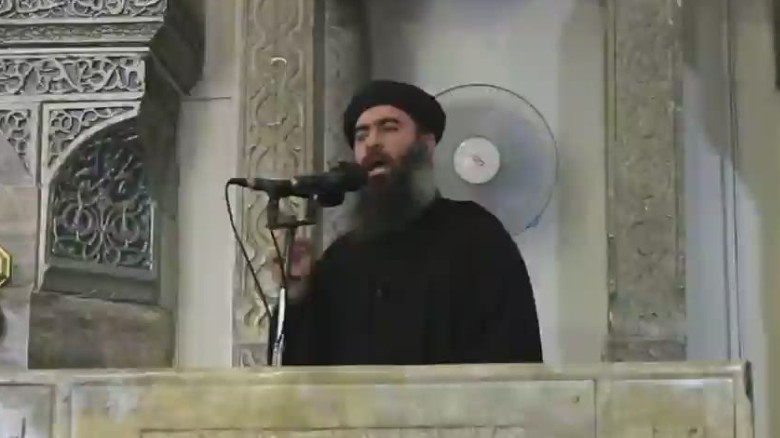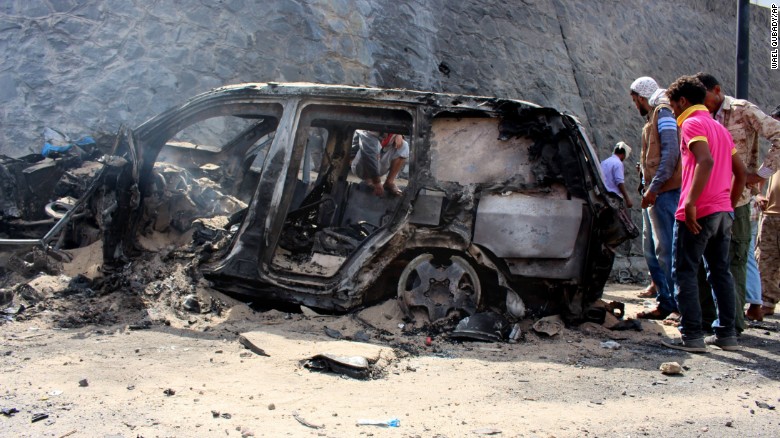The Islamic State in Iraq and Syria finds itself under growing pressure on several fronts, facing battlefield setbacks in both countries. In a new audio message Abu Bakr al Baghdadi, the self-proclaimed caliph of the Islamic State, has warned of difficult times ahead, saying “the whole world” is united against the Islamic State.
Al-Baghdadi’s 24-minute message — his first since May — appears to have been recorded in the past two weeks. The ISIS leader talks of a “general war” in which the “caliphate” is up against the West, Russia and their Arab allies — specifically Saudi Arabia. The recording was released Saturday by ISIS’ Al-Furqan Media.
“Do not be amazed by the meeting of the nations of disbelief and groups against the Islamic State,” says al Baghdadi. “If we are killed and the wounds are numerous and the problems amassed against us and the hardships are great, then it is no surprise either.”
Mounting challenges
Those problems for ISIS are multiplying. Iraqi security forces are on the verge ofclearing the center of Ramadi, the largest city in Anbar province which the terror group seized in May. Iraqi military officials report that ISIS has abandoned government buildings it occupied in the heart of the city.
In northern Iraq, ISIS is also struggling to keep open supply lines into Mosul, after the capture by Kurdish Peshmerga in November of the strategic route linking the city with the group’s Syrian territory.

In Syria, the U.S.-backed Syrian Democratic Forces (SDF) have inched closer to Raqqa, ISIS’ administrative headquarters, and took the Tishreen Dam on the Euphrates River, just 13 miles north of the city. This latest advance by the Kurdish-led SDF threatens to further erode ISIS’ access to the Turkish border through the town of Manbij.
The SDF are still some way from Manjib, which ISIS is expected to defend fiercely. But the area has a substantial Kurdish population, and activists claim that ISIS has begun executing Kurds in Manjib to deter an uprising.
Further east, ISIS’ oil fields and refining capacity around Deir ez-Zor have beenseverely damaged by months of airstrikes, reducing its revenues and fuel supplies.
Adaptable and resilient
In his latest message, Baghdadi candidly recalls previous setbacks for the Islamic State’s predecessors in Iraq, notably 10 years ago when the movement’s founder Abu Musab al Zarqawi was killed and Sunni tribes turned against it. “The seditions and the hardships became greater, such that the Islamic State fell back from many of the areas it had taken and controlled,” he says.
Even so, he tells supporters: “Be reassured, for your state is still good. Whenever the conspiring of the nations increases against it, the more certain (is) the support of Allah.”

That “conspiring” against ISIS has grown since the bomb attack on the Russian Metrojet airliner and the terror attacks in Paris, with the Russian air campaign shifting to include ISIS targets and France stepping up airstrikes on Raqqa.
Additionally, Saudi Arabia this month announced a coalition of 34 nations against terrorism, which Baghdadi devotes some time to ridiculing in his speech. By talking about America’s “proxies and henchmen,” he suggests ISIS will try to increase attacks inside Saudi Arabia. He also makes an appeal for jihadists from Saudi Arabia to join the group.
ISIS remains capable of tactical attacks on many fronts. Adaptable and resilient, it continues to probe the 600-mile frontline defended by Iraqi Kurds. Two weeks ago it launched a complex attack involving mortar fire and suicide bombs on a camp near Mosul where Turkish forces were training Iraqi volunteers and Kurdish Peshmerga in preparation for an assault — one day — on the city, ISIS’ most prized possession.
In Ramadi, ISIS is expected to stage ambushes in outlying suburbs, to prevent the city’s pacification and rehabilitation. In the view of the Institute for the Study of War, “Ramadi will remain exposed to counterattacks by ISIS, particularly from the north from ISIS-held Hit district, if (Iraqi security forces) shifts forces away from Ramadi to focus on other operations.”
And in Syria, despite the deployment of Russian helicopters to Homs province, ISIS has made limited gains around the town of Mahin, according to local activists, and taken regime positions near Deir ez-Zour.
There is still plenty of ebb and flow on this vast patchwork battlefield.
The long run
Baghdadi sees the future of the conflict in apocalyptic terms, referring to “the fight of all the nations of disbelief against the Ummah of Islam,” which he says is unprecedented. He calls on all Muslims to join jihad and mobilizes Islamic prophecy, speaking of the “final battle” in Dabiq — a town in northern Syria where there will be an epic clash against the “armies of Rome.”
In fact, he makes more than a call to jihad. He says it is obligatory, and as the “caliph” Baghdadi believes he has the religious authority to say that “waging this battle is a duty upon every Muslim and no one is excused.”
At the same time he mocks ISIS’ enemies for not sending ground troops.
“They do not dare to come because their hearts are full of fear from the mujahideen” thanks to their experiences in Afghanistan and Iraq, Baghdadi says.
There is also a thinly veiled hint in Baghdadi’s message that ISIS will look for further opportunities to export its war to the “far abroad.'”
“We promise you that anyone who participates in the war on the Islamic State will pay a high price and will regret it, so, plot O America, plot O Europe, plot O Russia,” he says.
If ISIS has its way, it will answer setbacks in its heartlands with attacks thousands of miles away.
As reported by CNN
